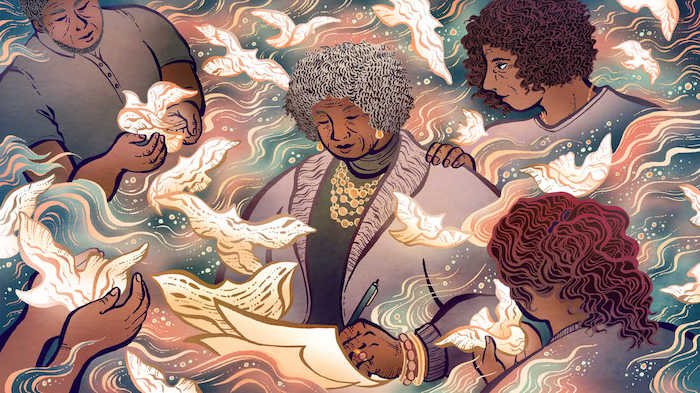— Perspectives on caring for loved ones during end-of-life

By Lora Parisien
Every day, hospice workers bring comfort to dying patients so that they may die with dignity and on their own terms. They extend grace and compassion to all, regardless of who they are or where they come from. This is the humble work of a Hospice of Michigan employee. This is the promise they keep: Every Person. Every Time.
But what happens when the hospice worker’s patient is a family member? Does having a hospice background make it easier to navigate the challenges of caring for a terminally ill patient when that patient is a loved one?
When she was just 10 years old, curiosity drew Sarah Beegen to the room in her family’s home where hospice staff were attending to her dying grandmother. “I wanted to know. I needed to know what was going on in there,” said Beegen. This same inquisitiveness led her to a career with Hospice of Michigan, where for the past 17 years, she worked her way from certified nurse assistant to her current role as manager of the not-for-profit’s referral center.
If anyone was fully prepared to care for a dying family member or insulated from the hardest aspects of death, certainly Beegen was. When her mother’s cancer became incurable, she “shut off my ‘hospice eyes’ and focused on other things. I didn’t want to see that mom was dying.”
The truth is, no amount of training or experience can prepare one for the death of a loved one — because dying is more than a medical event, it’s a deeply personal experience.
Hospice workers understand that both patients and their family members can struggle accepting life-limiting diagnoses. In 1969, Elizabeth Kubler Ross, a Swiss-American psychiatrist and pioneer in the worldwide hospice movement, identified five stages of grief. When faced with imminent death, denial, the first of the five stages, is a common reaction to change and loss. No amount of hospice training can derail feelings of grief. Denial is the defense against something that is impossible to accept.
“No matter how seasoned you are, you can never be prepared when the patient is your loved one,” says Beegen.
Tracey Pierce, director of marketing and communications for Hospice of Michigan, also found herself in unexpected territory when she reached out to her colleagues for help. In a matter of months, her mother- and father-in-law suffered falls, hospitalizations, and anxiety which led to a drastic decline in their health.
“It’s a different ballgame when you are on the other side. For as much as I thought I knew about hospice care, I realized how much I didn’t know. I’m grateful we had my work family to lean on. Hearing the stress in my voice, they calmly answered our questions and addressed our concerns with compassion and patience,” said Pierce.
That is the gift of hospice, a team of experts sweeps in and surrounds patients and families — and sometimes colleagues — with knowledge, skill, and compassion, providing wide-ranging physical, emotional, and spiritual support at a crucial time.
Beegen and Pierce both knew they needed help from the experts, the people she worked with every day. “If I learned one thing from my mother’s death, it’s not to be afraid to ask for help,” said Beegen.
“We always talk about providing care and dignity in hospice. It was evident in simple, nurturing acts, such as a hospice aide bathing my mother-in-law,” shares Pierce. That gave Pierce and her family the opportunity to focus on being present in all the precious moments they had left.
Redefining what was and shifting to what is now. Searching for meaning. Contending with change. Living day by day. Preparing for death. These are the hallmarks of coping with the terminal illness of a loved one. It is a highly personal experience, no matter who you are. Though it can be daunting, no one should face the end-of-life process alone.
Complete Article ↪HERE↩!
